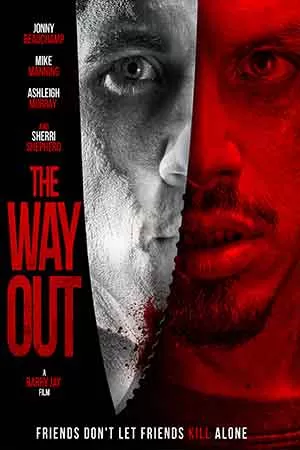**Introduction**
*The Way Out* (2022) is a captivating psychological thriller directed and written by Barry Jay. This intense film delves into deep psychological struggles, trauma, addiction, and the complexities of human relationships, particularly within the LGBTQ+ community. With a suspenseful narrative, the movie keeps viewers on the edge of their seats while exploring dark and thought-provoking themes.
**Plot Overview**
The story revolves around Alex Romero (Jonny Beauchamp), a young man grappling with the emotional and physical scars left by an abusive father. Working as a pizza delivery driver in a dead-end job, Alex’s life takes a sudden turn when he inherits his father’s house and the burdensome debts tied to it. As he attempts to rebuild his life, he meets Shane Collins (Mike Manning), a charismatic yet dangerous personal trainer.
Shane quickly becomes a powerful influence in Alex’s life, introducing him to self-defense and pushing him to grow stronger physically. However, Shane also subtly manipulates Alex, pulling him away from his support system, including his best friend Gracie (Ashleigh Murray) and his AA sponsor Veronica (Sherri Shepherd). As the relationship between Alex and Shane deepens, the true nature of Shane’s intentions becomes increasingly sinister, drawing Alex into a world of deception, power plays, and moral conflicts.
**Psychological and Emotional Depth**
*The Way Out* stands out for its exploration of complex psychological and emotional issues. Rather than simply presenting a straightforward thriller, the film dives into the mind of a traumatized individual striving to regain his sense of self-worth and control. Alex’s journey is a delicate balance between self-discovery and self-destruction, forcing the audience to reflect on where the line between liberation and manipulation lies.
Shane’s character is particularly compelling, acting both as an enabler and a predator. He provides Alex with strength and confidence, but at a significant cost. This dynamic creates a constant, unsettling tension throughout the film, keeping the audience invested in whether Alex will break free from Shane’s grip or fall deeper into his influence.
**LGBTQ+ Themes and Representation**
One of the film’s most significant strengths is its nuanced handling of LGBTQ+ themes. These themes are seamlessly woven into the storyline, avoiding any sense of forced or tokenized representation. Alex’s struggle with his identity, his traumatic past, and his complex relationship with Shane highlight the challenges many LGBTQ+ individuals face regarding self-acceptance, trust, and vulnerability.
The film also explores issues such as internalized homophobia, self-hate, and the societal pressures to conform. By addressing these topics, *The Way Out* adds layers of authenticity and emotional depth, making it more than just a psychological thriller—it’s a study of survival, healing, and self-reclamation.
**Performances and Direction**
Jonny Beauchamp delivers an emotionally charged performance as Alex, capturing the character’s vulnerability, pain, and eventual empowerment with remarkable authenticity. Mike Manning’s portrayal of Shane is equally compelling, striking the perfect balance between charm and menace. Their on-screen chemistry elevates the tension of the film, making their interactions even more gripping.
Director Barry Jay deserves recognition for crafting a film that is both visually striking and narratively intense. The cinematography enhances the film’s dark, suspenseful atmosphere, using dim lighting and tight framing to intensify the feeling of confinement and psychological turmoil. While the deliberately underlit scenes may not be appealing to all viewers, this choice effectively mirrors Alex’s descent into Shane’s world of control and deceit.
**Weaknesses**
Despite its successes, *The Way Out* is not without its flaws. Some viewers might find the pacing uneven, especially in the second act, where the tension builds more slowly instead of relying on constant action. Certain dialogue choices also feel somewhat clichéd, missing opportunities to further elevate the psychological depth of the narrative.
While the climax is intense, it might be predictable for seasoned thriller fans. However, the film’s focus on character development and emotional depth compensates for any narrative predictability, making the story’s progression feel more grounded in its exploration of relationships and inner conflict.
*“If you can think of him as sick instead of bad, the shift in your perception might be the miracle you need.”*
**Final Verdict**
*The Way Out* is a thought-provoking psychological thriller that skillfully blends intense drama with LGBTQ+ representation. It is a film that doesn’t just entertain but also sparks important conversations about trauma, abuse, identity, and the dynamics of power in relationships.
With standout performances, a compelling storyline, and a haunting atmosphere, *The Way Out* is a must-watch for fans of psychological thrillers with emotional depth. While it may not be a perfect film, its strengths far outweigh its weaknesses, leaving a lasting impact on its audience.






